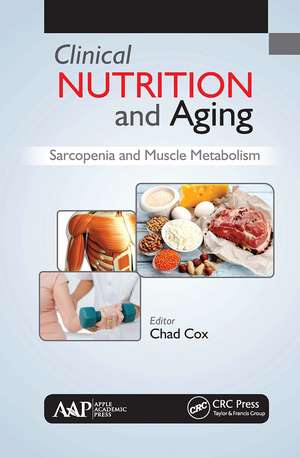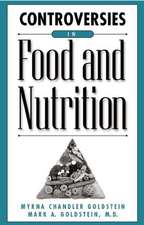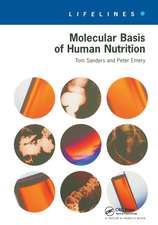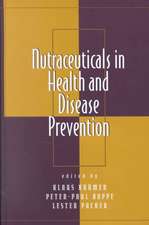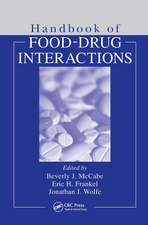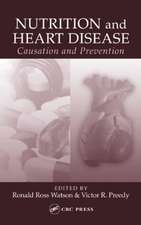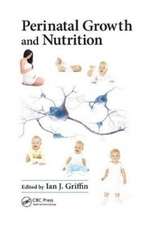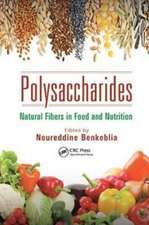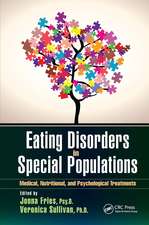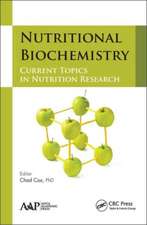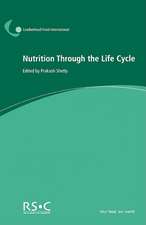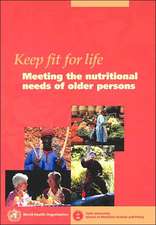Clinical Nutrition and Aging: Sarcopenia and Muscle Metabolism
Editat de Chad Coxen Limba Engleză Paperback – 31 mar 2021
Sarcopenia—the loss of muscle mass and strength that occurs with advancing age—is a major health challenge, particularly in North America, Europe, and Japan, which have large aging populations. This compendium volume is a valuable addition to the existing literature, providing state-of-the-art information on the most effective prevention and treatment options. Included are research articles on nutrition management and the prevention of sarcopenia; protein therapy for sarcopenia; effect of exercise on sarcopenia; and other therapeutic strategies, including antioxidants and steroids.
| Toate formatele și edițiile | Preț | Express |
|---|---|---|
| Paperback (1) | 578.34 lei 6-8 săpt. | |
| Apple Academic Press Inc. – 31 mar 2021 | 578.34 lei 6-8 săpt. | |
| Hardback (1) | 957.10 lei 6-8 săpt. | |
| Apple Academic Press Inc. – 24 feb 2016 | 957.10 lei 6-8 săpt. |
Preț: 578.34 lei
Preț vechi: 680.40 lei
-15% Nou
Puncte Express: 868
Preț estimativ în valută:
110.66€ • 115.55$ • 91.38£
110.66€ • 115.55$ • 91.38£
Carte tipărită la comandă
Livrare economică 15-29 aprilie
Preluare comenzi: 021 569.72.76
Specificații
ISBN-13: 9781774636190
ISBN-10: 1774636190
Pagini: 306
Ilustrații: 23
Dimensiuni: 152 x 229 x 16 mm
Greutate: 0.42 kg
Ediția:1
Editura: Apple Academic Press Inc.
Colecția Apple Academic Press
ISBN-10: 1774636190
Pagini: 306
Ilustrații: 23
Dimensiuni: 152 x 229 x 16 mm
Greutate: 0.42 kg
Ediția:1
Editura: Apple Academic Press Inc.
Colecția Apple Academic Press
Public țintă
Academic and PostgraduateCuprins
How Nutrition and Other Factors Relate to Sarcopenia. Nutrition and Sarcopenia: A Review of the Evidence and Implications for Preventive Strategies. Malnutrition-Sarcopenia Syndrome: Is This the Future of Nutrition Screening and Assessment for Older Adults? Novel Insights on Nutrient Management of Sarcopenia in the Elderly. Protein and Exercise.Whey Protein and Essential Amino Acids Promote the Reduction of Adipose Tissue and Increased Muscle Protein Synthesis during Caloric Restriction-Induced Weight Loss in Elderly, Obese Individuals. Insulinotropic and Muscle Protein Synthetic Effects of Branched-Chain Amino Acids: Potential Therapy for Type 2 Diabetes and Sarcopenia. Myofibrillar Protein Synthesis Following Ingestion of Soy Protein Isolate at Rest and After Resistance Exercise in Elderly Men. The Link between Dietary Protein Intake, Skeletal Muscle Function and Health in Older Adults. The Pleiotropic Effect of Physical Exercise on Mitochondrial Dynamics in Aging Skeletal Muscle. Other Therapeutic Strategies. Novel Intriguing Strategies Attenuating to Sarcopenia. Muscle Wasting and Resistance of Muscle Anabolism: The "Anabolic Threshold Concept" for Adapted Nutritional Strategies during Sarcopenia. Rationale for Antioxidant Supplementation in Sarcopenia. Sarcopenia and Androgens: A Link between Pathology and Treatment.
Notă biografică
Dr. Chad L. Cox is a Lecturer in the Department of Chemistry and the Department of Family and Consumer Sciences at California State University, Sacramento. He also teaches at Sacramento City College and the University of California, Davis. He holds a PhD in Nutritional Biology, a Bachelor of Science in Exercise Biology, and a Bachelor of Science in Nutrition Science, all from UC Davis. His research interests include the causes of obesity and obesity-related chronic diseases, how exercise training can induce changes in the regulation of gene expression that can lead to improvements in insulin sensitivity and promote energy balance, and the development of pharmacological agents that could help reduce the epidemic of obesity, Type 2 diabetes, and metabolic syndrome.
Descriere
This title includes a number of Open Access chapters.
Sarcopenia—the loss of muscle mass and strength that occurs with advancing age—is a major health challenge, particularly in North America, Europe, and Japan, which have large aging populations. This compendium volume is a valuable addition to the existing literature, providing state-of-the-art information on the most effective prevention and treatment options. Included are research articles on nutrition management and the prevention of sarcopenia; protein therapy for sarcopenia; effect of exercise on sarcopenia; and other therapeutic strategies, including antioxidants and steroids.
Sarcopenia—the loss of muscle mass and strength that occurs with advancing age—is a major health challenge, particularly in North America, Europe, and Japan, which have large aging populations. This compendium volume is a valuable addition to the existing literature, providing state-of-the-art information on the most effective prevention and treatment options. Included are research articles on nutrition management and the prevention of sarcopenia; protein therapy for sarcopenia; effect of exercise on sarcopenia; and other therapeutic strategies, including antioxidants and steroids.
